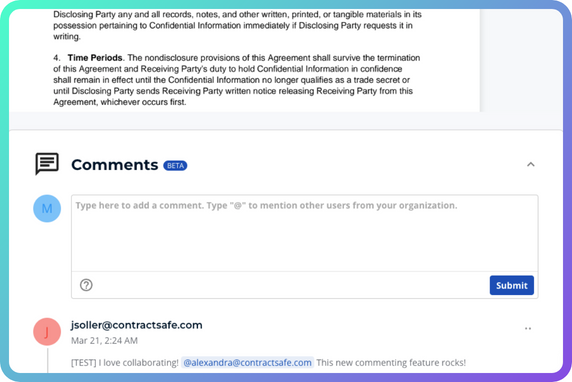What is Contract Termination?
What is Contract Termination?
Contract termination refers to the ending or cancellation of a legally binding agreement between two or more parties. When a contract is terminated, it means that the parties involved are released from their obligations and no longer have to perform the terms outlined in the contract.
There are various reasons why contract termination might occur, ranging from breach of contract and completion of the agreed-upon tasks, to mutual agreement or frustration of purpose. Understanding the reasons for contract termination and the proper steps to follow can help parties navigate this process effectively.
Common Reasons for Contract Termination and How to Avoid Them
The most common reasons people terminate contracts include:
- Breach of Contract: When one party fails to fulfill their obligations as outlined in the contract, it can be considered a breach of contract. To avoid this, it is essential to clearly define the terms and obligations within the contract, and conduct thorough due diligence to ensure both parties can realistically fulfill their responsibilities.
- Completion of Tasks: In some cases, a contract is terminated after the completion of the tasks outlined within it. This can occur with time-bound contracts or contracts with specific deliverables. To avoid any confusion, it is crucial to clearly define the completion criteria for the tasks or project in the contract.
- Mutual Agreement: Parties may mutually agree to terminate a contract if they find it no longer serves their interests, there is a change in circumstances, or they wish to pursue alternative arrangements. To minimize the risk of disputes, it is advisable to include a termination clause in the contract that outlines the process and conditions for mutual termination.
- Frustration of Purpose: A contract may be terminated if an unforeseen event occurs that makes it impossible or drastically changes the purpose of the contract. To prevent this, parties can include force majeure clauses that stipulate the procedures to follow in the event of unexpected circumstances.
Common Ways People Terminate Contracts
Contracts can be terminated through various methods, including:
- Performance: Contracts can be terminated once both parties have fully performed their obligations as stated in the contract. This typically occurs when the agreed-upon services or tasks have been completed or the agreed-upon time period has elapsed.
- Agreement: In cases where both parties agree on the termination, they can execute a termination agreement that outlines the terms and conditions of the termination. This helps ensure a smooth transition and minimizes the risk of future disputes.
- Breach: If one party fails to meet their obligations or breaches the terms of the contract, the other party may choose to terminate the contract. However, it is important to review the contract terms and consult legal advice before terminating based on a breach.
- Rescission: Rescission refers to the termination of a contract due to the presence of misrepresentation, fraud, duress, or mistake. Rescission essentially nullifies the contract from its inception, as if it never existed.
How to Properly Terminate a Contract
While the process for terminating a contract may vary depending on the specific circumstances and jurisdiction, here are some general steps to consider:
Step 1: Review the Contract: Carefully review the contract terms, conditions, and termination provisions to ensure you understand the agreed-upon procedures for termination.
Step 2: Identify the Reason for Termination: Determine the reason for terminating the contract, ensuring it falls within the grounds for termination as defined in the contract.
Step 3: Communicate and Negotiate: Engage in open communication with the other party to discuss the termination and attempt to negotiate a mutually satisfactory resolution.
Step 4: Follow the Contractual Procedures: Adhere to the specific contractual procedures for termination, such as providing written notice within a specified timeframe or engaging in mediation or arbitration processes if required.
Step 5: Document Everything: Keep thorough records of all communications and actions taken during the termination process. This will help in case of any future disputes or legal proceedings.
Step 6: Seek Legal Advice: Depending on the complexity of the contract and the termination circumstances, it is advisable to seek legal advice to ensure you are following all relevant laws and regulations.
Contract Management Best Practices for Contract Termination
To ensure efficient contract termination, consider the following best practices:
- Proper Documentation: Keep all contract-related documents, amendments, communications, and records in a centralized and organized manner to facilitate termination processes and future reference.
- Clear Communication: Maintain open and clear communication channels with the other party throughout the termination process to minimize misunderstandings and disputes.
- Compliance with Legal Provisions: Ensure that the termination process complies with all applicable laws, regulations, and contractual provisions to minimize legal risks.
- Professionalism and Courtesy: Conduct termination discussions and negotiations in a professional and diplomatic manner to protect relationships and avoid damaging reputations.
- Knowledge of Termination Clauses: Familiarize yourself with the termination clauses within the contract to understand the rights and obligations of all parties involved.
- Review Termination Procedures: Regularly review and update internal policies and procedures for contract termination to reflect any changes in regulations or business requirements.
By following these best practices and creating a comprehensive plan for contract termination, parties can effectively manage the termination process and minimize any potential legal or financial complications.
Get Started with ContractSafe Today





